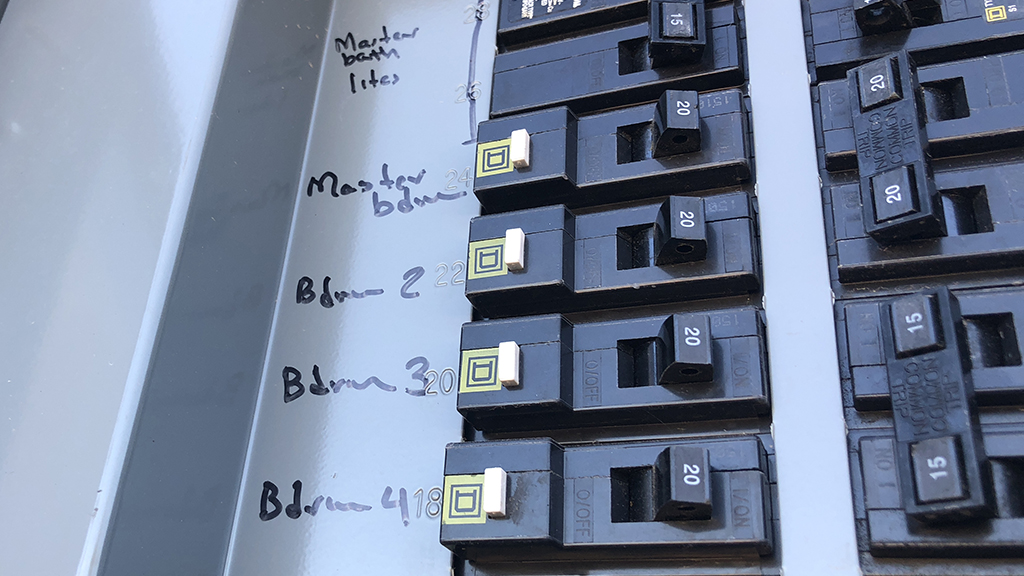It’s a frustrating moment—just as you’re about to use the microwave or hair dryer, the lights flicker, and a portion of your home goes dark. You walk to the panel, flip the breaker, and go back to what you were doing. But then it happens again. And again.
If your breaker keeps tripping, it’s not something to ignore. While it may seem like a small inconvenience, this issue can point to deeper electrical imbalances or potential hazards behind the scenes. Here’s a straightforward look at why breakers trip, what homeowners can do safely, and when it’s time to involve a professional.
Why your breaker keeps tripping: 5 common causes
1. Too many things on one circuit
This is the most common scenario: several high-power appliances plugged into the same outlet or room circuit. Your breaker is doing its job—it shuts off to prevent overheating.
Common culprits include:
- Running space heaters or blow dryers while other appliances are already on
- Kitchens with toaster ovens, air fryers, and coffee makers sharing one outlet
- Garages or workshops with multiple tools on one line
If this happens often in the same room, you may need a circuit dedicated to that space.
2. Short circuits
A short circuit occurs when a hot wire touches a neutral or ground wire—this creates a surge of electricity the breaker can’t handle. It’s usually sudden, and the breaker trips immediately after something is turned on.
Signs to watch for:
- A burning smell near an outlet
- Scorch marks or warmth around plugs
- A breaker that won’t reset after tripping
Short circuits should always be handled by an electrician, as they can lead to electrical fires.
3. Ground faults
Ground faults are similar to short circuits but usually happen in damp or outdoor areas—kitchens, bathrooms, patios. If moisture gets into an outlet or wire, electricity may flow along an unintended path.
That’s why modern homes require GFCI (Ground Fault Circuit Interrupter) outlets in these locations. If your breaker trips near water or outside, check your GFCI outlets—many have a small reset button that can restore power.
4. An aging or faulty breaker
Like any other home component, breakers wear out over time. If your electrical panel is over 20–25 years old and you’re seeing frequent trips without a clear load issue, the breaker itself may need replacement.
Older panels may also lack capacity for today’s electronics and appliances. This is especially common in homes that have been remodeled, added onto, or are using newer high-demand systems.
5. Your home’s power needs have outgrown the panel
Even if your wiring is sound, your panel might simply be at its limit. Breakers trip when the system can’t safely support your electrical demand.
This often happens when homeowners:
- Add a second fridge, deep freezer, or high-wattage appliance
- Set up home offices with computers, monitors, and printers
- Install EV chargers or mini-split ACs without updating the panel
An electrical load assessment from a licensed electrician can help determine if your panel needs an upgrade—or if balancing your circuits will solve the issue.
What homeowners can do safely
Before calling in a pro, there are a few simple things you can try:
- Unplug a few devices and see if the breaker holds
- Test GFCI outlets by pressing the reset button
- Inspect plugs and cords for damage or overheating
But if the breaker trips again after a reset, or you’re not sure why it’s happening, stop there. Resetting a breaker repeatedly isn’t a fix—it’s just delaying a potentially more serious problem.
Final thoughts
A breaker that trips occasionally may be protecting your home. But if it’s happening regularly—or immediately after using certain outlets or devices—it’s time to get to the bottom of it.
Understanding the cause is the first step. The next is deciding whether a new circuit, a panel upgrade, or a simple fix is the right move. That’s where a licensed electrician can help.
Need answers? A Team Home Services can evaluate your panel, test your circuits, and recommend smart panel upgrades that keep your home running safely and smoothly now and long term. Contact us today to schedule.

